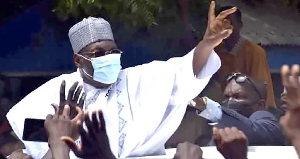We woke up on Saturday October 18, 2014, to newspaper screaming headlines of a ceasefire with the Boko Haram, by the Chief of Defense Staff, Air Chief Marshal Alex Bade issuing a directive to the service chiefs of the Army, Navy and the Air Force, and the Inspector General of Police, to comply with the cease fire agreement on all areas of operations.
This meant that the cease fire agreement was so neatly packaged that both parties were to comply with the terms, details of which is yet to be published, except that the over 200 Chibok girls were expected to be released as part of the deal. This vacuum fuelk led speculations about the terms of the said agreement.
Some said the girls would be released on the October 21, others said the 2015 elections would be postponed as part of demand by the terrorists, and that war prisoners on both sides shall be released by each party to the deal, etc. The FG must have been very pleased with the cease fire, and I was quite expectant of the postponement of the 2015 elections, because that ought to be the most reasonable thing to do at this time, in the best interest of the country.
It will almost border on rash insensitivity and unseriousness for a nation in war to find time for campaign razzmatazz and soap box theatricals, which will constitute a huge distraction to those who must plan and execute the war.
The Chibok girls are yet to be released, while the nation continues to push on with frenzied campaign arrangements, making it necessary to question the real benefits of the cease fire.
The expected release of the Chibok girls at this time, when political campaigns are about to kick off, leads many to wonder what kind of politicians we have. Have they been playing politics with the girls? Was it a mere coincidence they are just about being released at this time?
The cease fire in itself appears a welcome development, as it will enable the poor people of the war-torn North East zone to breathe some fresh air once again, recollect themselves, find scattered relations and friends and gather what may look like a peaceful life, even though it can never be life as they had it before the war.
Cease fire will also allow our fighting forces to re-arm, re-equip, re-organise and sort themselves out to be able to tackle the challenges of saboteurs in the war campaign so far.
However, there are some very bad sides and implications. First, is that it will give the terrorists time to re-organise, re-group and possibly select a new leader. The original Shekau who was the first leader of the terrorists was killed under General Ihejirika as the Chief of Army Staff, COAS, while the second or fake Shekau was killed under the incumbent COAS.
It set them very confused and devastated leading to the heavy casualties that they sustained in the recent past. The ceasefire will therefore give them the time they desperately need to re-plan, and re-arm and restructure, to be able to re-launch attacks whenever they may feel ready and able to do so.
Boko Haram is accepting this cease fire deal because of the heavy casualties they have suffered recently in the hands of the combined fighting forces of Nigeria, Cameroon, and Chad Republics.
Second, is that politicians will soon be carried away with campaigns, while the common enemy, Boko Haram, re-organises, and strategises preparatory to their next bloody onslaught.
Third, is that the seeming peace which the cease fire will engender will coax Nigerians to relax the prevalent high vigilance, while their enemy, the jihadists, will seize the opportunity to move themselves deep into other safer areas of Nigeria, like the South West, South East and South-South.
Fourth, the cease fire will help Boko Haram more than it will help Nigeria, because this war is not just about political power, it is a form of Jihad as far as the enemy is concerned. Their sole aim, ultimately, is to exterminate other religions from Nigeria, especially Christianity.
Their methods, may be rough, wicked, inhuman, and even embarrassing to some of their sponsors, but the rate of growth of that group within the last two years shows that their sponsors are not really bothered.
They kill, behead and commit all kinds of atrocities in the name of Islam encouraged by their sponsors and some saboteurs in the Nigerian system. It will therefore be naïve and even fool hardy, to expect the cease fire to be of any great value to Nigeria.
Terror sponsors will use the time of temporary truce to re-plan their support for the insurgents by creating new means of channelling funds to them. While the cease fire may seem good and attractive to some politicians, many of them have failed to realise how dangerous and risky it could be to trust jihadists because of the deep religious influence involved.
Jihadists attach little or no value at all to the life and property of non-Muslims and therefore will have no respect for any agreement with them in the first place. Boko Haram should therefore not be trusted by Nigerians for any reason whatsoever!
In a conventional war, usually the armies on both sides are trained and disciplined combatants, with ability to follow the cease fire process. But in this type of war, where you are dealing with half-baked volunteer and commandeered fighting personnel like they have in Boko Haram, anything can happen, more so with the hindrances America and Europe seem to be posing to Nigeria.
This was why the terrorists were busy killing people in villages around Borno State, while the cease fire was being announced. This could turn out to be a very deadly cease fire for Nigerians both within the war zone and elsewhere in the country !
Opinions of Tuesday, 18 November 2014
Auteur: Clement Udegbe, a legal practitioner
Boko Haram’s deadly ceasefire
Culture













